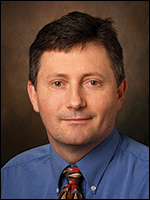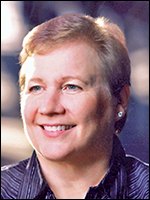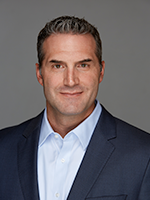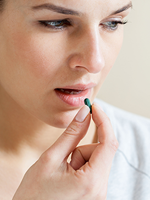Cancer. Of the roughly 171,000 words in the English language, it is certainly one of the worst words. Cancer is selfish; it does not care about race, religion, gender, age, or orientation. Its malevolent vanity only lends to an unstoppable urge to reproduce and spread itself as quickly and efficiently as possible. Cancer: Deadly, dark, and devastating; a disease that revels in its extraordinary persistence. Cancer: Is there any way you can make the word any worse?
“You have cancer.” These are 3 words that many healthcare providers and pharmacists have delivered to patients. Within the context of a multidisciplinary team, this phrase is often the start of an extremely difficult conversation, but it is uncommon for a team member to be on the receiving end of that exchange.
And yet, on August 19, 2013, I was on the receiving end of that devastating phrase, and froze in fearful disbelief. The day I received the diagnosis of advanced, stage III bulky Hodgkin lymphoma at age 29 years was the worst day of my life. Nothing could have prepared me to understand the gravity of, or how to deal with, being diagnosed with cancer as a young clinical pharmacist.
Despite my years of clinical practice, a grueling residency, and encountering some of the most challenging patients admitted to an inner-city level I trauma hospital, I was lost. “Am I going to die?” “Will I ever be a father?” These were the questions that ran through my mind.
The diagnosis came at a time in my life when I thought I was invincible. My career was expanding as I took on the PGY1 residency coordinator position, faculty appointments, and Board of Pharmacy Specialties certification. It was also the time when my wife, also a clinical pharmacist, and I were slowly turning our new house into our home and planning on starting a family. Cancer at 29? Impossible.
My diagnosis created a strange dichotomy: I approached everything as a confident, board-certified clinical pharmacist specialist, who has now become a frightfully vulnerable patient with cancer. The weeks after my diagnosis were a whirlwind of scans, laboratory tests, physical examinations, and a peripherally inserted central venous catheter placement.
During each appointment, I bathed in anxiety while sitting on the exam table as a patient. This perspective was foreign to me. The room looked different. Everyone on the multidisciplinary team seemed to be taller. Despite our previous professional relationships, they now appeared intimidating.
Between scans and exams I would confidently put my pharmacist hat back on. Precepting 2 fourth-year pharmacy students and 1 PGY1 resident was a welcomed distraction. When not teaching, however, I would obsessively research everything related to Hodgkin lymphoma, diving deeper into a literature-filled abyss. Journeying deeper down the rabbit hole, I thought I would find glimmers of hope, a silver lining for my situation, or something that would show me how I could have prevented this nightmare.
This was when I realized the power and danger of having so much knowledge at your fingertips. Confirmation bias ran unhinged in my searches. Although I quickly educated myself on all aspects of Hodgkin lymphoma, at the end of the day, it had not changed the fact that I had a cancer growing inside me, with a single fatal goal.
Midway between my diagnosis and the first day of treatment, my oncologist discussed the treatment options with my wife and me. Survival and fertility were our top concerns; we had not had any children yet. As we methodically discussed the treatment regimens, we were informed of a new clinical trial for which I was eligible.
As a pharmacist, I knew the importance of clinical research and how the current standards of care had once been evaluated in a clinical trial. But as a patient, I worried about the unknowns: “How would I be randomized?” “What adverse effects would I succumb to?” “Will this work?”
Understanding our clinical backgrounds, my oncologist gave me and my wife a few days to digest the clinical trial idea and research the data on our own. After evaluating seemingly every possible angle of every regimen, we agreed that I would enroll. We knew that participating in a clinical trial represented a major risk because of randomization, but as much as cancer is personal, as a pharmacist you know that you are part of something bigger when enrolling in clinical research.
On September 11, 2013, I arrived at the oncology infusion center ready to begin cycle 1, day 1 of my chemotherapy. For the next 6 months I was to receive the regimen of doxorubicin, brentuximab vedotin, vinblastine, and dacarbazine every 2 weeks. Despite receiving lorazepam for chemotherapy-induced nausea and vomiting (CINV), every sense seemed heightened. I could smell burned coffee in the air, taste the saline infusion in the back of my throat, and hear sounds and beeps that I routinely was able to ignore at work.
Sitting in the infusion chair, my wife and I looked at each other as the first milliliters of the ruby-red adriamycin slowly entered my body. For the first time in weeks, I felt relief knowing that I was finally attacking the cancer that had been attacking me for so long. Along with the sense of relief, however, came an overwhelming fear of the unknown of what lay ahead. After nearly 10 hours of infusions, we went home, exhausted but hoping for the best.
For the next 6 months, I gained a perspective that could not have been taught at pharmacy school—a patient’s perspective. I interpreted statistics in a new way: When told I would have a 60% to 75% chance of remission, the pharmacist in me looked favorably at the positive prognosis. As a patient, however, I heard the inverse: that I would have a 25% to 40% chance of relapse, treatment failure, or death. Statistics tell the truth, but not the human story. It was a viewpoint that I had not considered before.
Side-effects management became another key aspect of my life. The cumulative nature of nausea, vomiting, and fatigue engulfed my quality of life, as I tried to maintain hydration and an appetite after each round of chemotherapy. My hair loss began quickly, and I soon realized that some of the most important hairs on our body are those in the nose, eyebrows, and eyelashes. The frequent hiccups only exacerbated the desire to vomit.
My knowledge of pharmacology advised me to increase the use of a phenothiazine, such as taking prochlorperazine as-needed for CINV, but to no avail. Urban legends ensued, and I discovered that singing a Whitney Houston song at the top of my lungs was the only way to control my spastic diaphragm. Unconventional, terrible sounding, but effective!
At the end of 12 rounds of chemotherapy, on February 12, 2014, I was declared to be in complete remission. That day stands out as a major milestone in my journey, and one that I do not take for granted. Little did I know that the pathway for survivorship was going to be as difficult as, if not more difficult than, chemotherapy itself.
Counting down my final rounds of chemotherapy, the number of remaining anti-nausea pills, and looking at a calendar date with eager anticipation, was ephemeral and quantitative. There was an end point, and it was easy to follow. Navigating my recovery path, however, was entirely qualitative.
The symptoms of lymphoma are so benign, that every subsequent cold I had, I feared that the lymphoma relapsed. I became a prisoner of my thermometer, checking my temperature multiple times a day, sitting in angst when my basal temperature increased just 0.1°F. Post-traumatic stress disorder (PTSD) quickly emerged, and I was unable to accept that this was my “new normal.”
A common saying states, “It takes a village to raise a child.” That saying also applies to patient care: It takes a village (or a team of experts) to treat a patient. Many pharmacists take part in multidisciplinary care, and we understand the value that a collaborative team of experts can provide to a patient. I never imagined succumbing to “survivor’s guilt” or to PTSD, and if it were not for my oncology team’s advocacy that I should seek counseling, I would have fallen into a dark depression.
The counseling assistance that I received, and what my wife was offered, were lifesaving. It was also through this counseling relationship that I became a patient advocate, and gained one of the most important lessons from my cancer journey.
Despite the enormous challenge that a cancer diagnosis brings, and the pride that one should have in conquering it, I had not found one patient who wished to be defined by their disease. “Cancer does not have to define you”—I adopted this affirmation in my patient care, and I encouraged my trainees to empower patients to believe that they have control over their disease, rather than the reverse.
As cancer treatments continue to evolve and improve patient outcomes, we are fortunately seeing more patients live as survivors and/or with a stable disease. However, as overall survival and progression-free survival have increased over the past few decades, a parallel increase in the incidence of PTSD for patients and their caregivers has been reported as well.1,2
Pharmacists are unique in their role within the healthcare team. Accessible, knowledgeable, and trusted, our skills transcend our pharmacology knowledge base, as outlined in a recent article on ethics ratings among healthcare providers.3 Although my experience only represents an N of 1, I urge you—as a pharmacist—to become involved in or expand your role in the survivorship care of your patients and their caregivers.
In their book, Off Our Chests: A Candid Tour Through the World of Cancer, world-renowned gastrointestinal oncologist John Marshall, MD, and his wife Liza, who battled triple-negative breast cancer, stated that a cancer diagnosis forces us to face our mortality, and maintaining hope is critical to reaching the best outcomes for patients.4 After we lend our expertise during chemotherapy or other therapies, we can continue to provide hope and assistance to our patients as they navigate the path of survivorship.
Acknowledgments
Krystle, Mila, and Eliana—you are my life, love, and beacons of hope. Dr Ramchandren, Dr Vettese, and every pharmacist, nurse, and provider who helped me during my cancer journey—I am forever indebted to your care and optimism as we battled cancer together. The motivated and hardworking people at Seagen—thank you for your innovation and for making a meaningful difference in the lives of patients. Finally, all patients with cancer—you are true role models and inspiration. Never stop fighting!
Disclaimer
Although I work in the biotechnology field, the views and opinions expressed in this article are entirely my own and do not necessarily reflect the views and opinions of my employer.
References
- De Padova S, Grassi L, Vagheggini A, et al. Post-traumatic stress symptoms in long-term disease-free cancer survivors and their family caregivers. Cancer Med. 2021;10:3974-3985.
- Cordova MJ, Riba MB, Spiegel D. Post-traumatic stress disorder and cancer. Lancet Psychiatry. 2017;4:330-338.
- Brenan M. Nurses retain top ethics rating in U.S., but below 2020 high. Gallup. January 10, 2023. https://news.gallup.com/poll/467804/nurses-retain-top-ethics-rating-below-2020-high.aspx. Accessed January 20, 2023.
- Marshall J, Marshall L. Off Our Chests: A Candid Tour Through the World of Cancer. Oakton, VA: Ideapress Publishing; 2021.




